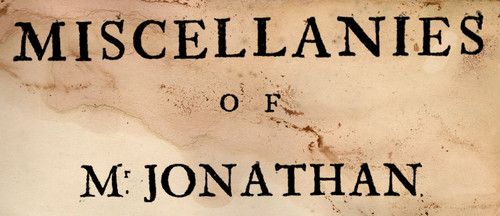
unearths some literary gems.
"Jumping Pete!" he exclaimed.
"No personalities, please."
***
"Who's Who. Why the devil should the old chap be interested in who may or may not be who?"
***
"Between you, me, and the Irwell..."
[This variant on "...and the lamppost" does not come up in Google. I see that the Irwell is a river in England (but not the part of England in which this book is set).]
***
[Bonuses]
1. "Timbukthree" appears as a malapropism, precursing the similarly named pop group. This book is from 1960, but Google brings up a couple of earlier Timbukthrees, one being an anecdote/gag from 1943 about a student who tries to answer "Where is Timbuktu?" by assuming it can be found between "Timbuk one and Timbuk three"; and the other being an ad in a 1954 magazine boasting that "from San Francisco to the Shetland Isles; from Vancouver to Johannesburg; from Timbuktu to Timbukthree....The whole world is now coming to Taste [sic] the magnificence of Our Coffees [sic]!"
2. I've known the saying "Many a mickle makes a muckle" for a couple of decades, but I believe this novel marks the first time I've actually encountered the word "muckle" totally in the wild—i.e., not in the context of that saying, just in the course of reading a work of fiction and while making no deliberate effort to scour the literary horizon for "muckles." The author is English, but the word is used in ordinary conversation (i.e., not a lecture about Scottish vocabulary, or anything meta like that) by a Scottish character. He says "ken too muckle" to mean "know too much." There's an impulse to think I deserve some sort of prize for garnering a "muckle," after all these years—but, of course, a "muckle" is its own reward. And now I can begin keeping my eyes open for that elusive "mickle," which is bound to show up in another decade or two. Watch this space!



